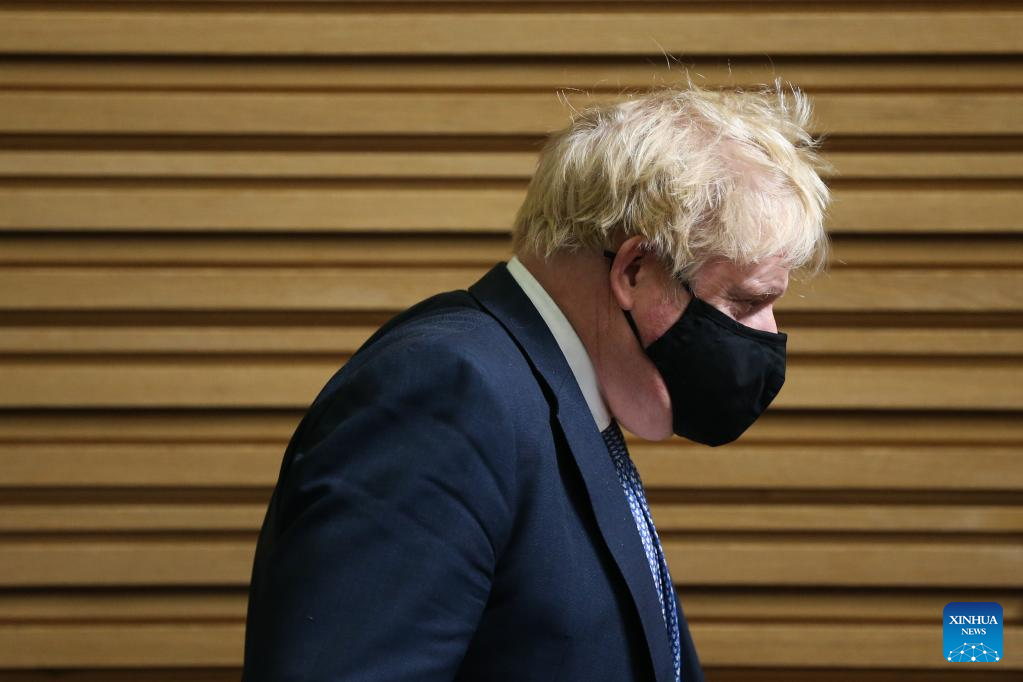Johnson resignation was inevitable, observers say
By BO LEUNG in London | China Daily Global | Updated: 2022-07-12 09:11

British PM's departure from office described as 'most disorderly' ever
Boris Johnson's resignation as Britain's prime minister was inevitable following a series of scandals that lead to his downfall, according to political commentators.
Philip Catney, a senior lecturer in politics at Keele University in Staffordshire in the United Kingdom, said Johnson's administration was never going to end well as he "simply doesn't have the ability to govern properly".
" (Johnson) is a fantastic campaigner for the Conservatives, but a terrible governor," Catney said. "And this is one of the problems they had; all his frailties, all the errors of judgment, all the weaknesses in his ethical constitution…all these things came very clearly, exposing his premiership which has been lurching from one disaster to another."
Manuel Muniz, provost of IE University and dean of IE School of Global and Public Affairs in Spain, said: "The failure of Boris Johnson has a personal reading: the fact that what is being called into question is his fitness to hold public office. But it also has a structural dimension. He is the latest of a series of populist leaders to be ejected from office after failing to deliver on their promises."
Muniz said Johnson's legacy was "one of disorder, broken promises and scandals".
"On the Brexit front, all he can claim to have achieved is further fracture with EU partners on the Northern Ireland Protocol and other dossiers. As such, he joins a long list of populists who have failed at the management of their countries," Muniz added.
Richard Toye, professor and historian at the UK's University of Exeter, described Johnson's resignation as possibly the "most disorderly end to a British premiership ever".
"Even when (Herbert) Asquith was replaced by Lloyd George during World War I, and (Neville) Chamberlain by (Winston) Churchill during World War II, it was possible to complete the process swiftly and with some dignity," Toye said.
"Contrasting these and other Downing Street defenestrations with the fall of Boris Johnson, one notices that they were all comparatively smooth transitions, even though bitter feelings were involved. Personality was always a part of what was at stake, yet great issues were always involved. Johnson may now have upstaged his famous predecessors, but only in the spectacularly chaotic manner of his going."
Johnson announced on Thursday he would stand down as Conservative Party leader, but plans to carry on as prime minister until the autumn while his successor is chosen.
However, opposition parties and some Conservative Party lawmakers said that he needs to go immediately, calling for an acting leader to be appointed in the interim, to avoid government paralysis.
"The government is absolutely paralyzed," Catney, the lecturer at Keele University, said. "Given the circumstances of Johnson's departure, there are a lot of people now saying he can't be trusted to stay in office, what damage could he do in three months while the Conservatives choose a new leader."
Muniz noted that Johnson will be "under immense pressure to leave".
"This will manifest itself in a rapid and effective leadership contest being conducted by the Tory party. Once the Tories have a new leader, the change of PM will be swift. I very much doubt he will last in office until the autumn," Muniz said.
Bronwen Maddox, director of the Institute for Government, a leading independent think tank, commented that if Johnson continues as caretaker, he will need to accept limits to his powers.
"Johnson also needs to accept that he cannot do much in these months-and nothing that is contentious. Very likely, Ukraine will be prominent. His vigorous support for President Zelensky has had the warm support of public opinion," Maddox said.
"But much of the vast and sprawling program in the recent Queen's Speech will now need to pause until a new leader is picked, particularly the controversial elements such as Channel 4 privatization and probably human rights reform."
She added: "Highly controversial legislation relating to the Northern Ireland Protocol, and the sweeping powers it gives ministers, probably now enters paralysis as well. The European Union will not bother to give one more breath of negotiating time to Johnson."
























